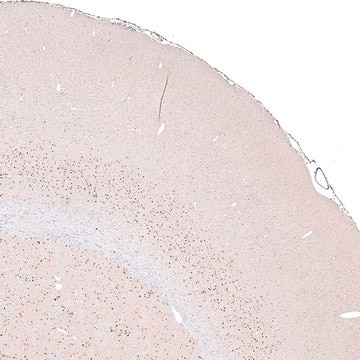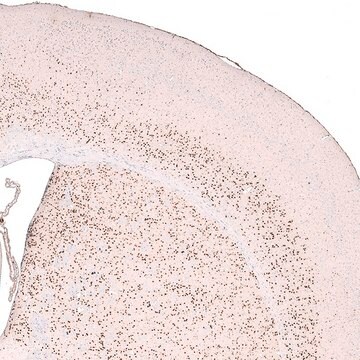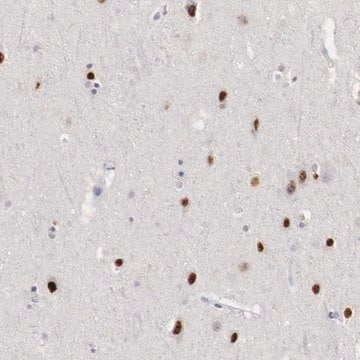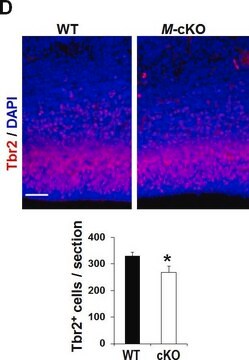MABE415
Anti-FoxP2 Antibody, clone FOXP2-73A/8
clone FOXP2-73A/8, from mouse
Synonym(s):
Forkhead box protein P2, CAG repeat protein 44, Trinucleotide repeat-containing gene 10 protein
About This Item
Recommended Products
biological source
mouse
Quality Level
antibody form
purified immunoglobulin
antibody product type
primary antibodies
clone
FOXP2-73A/8, monoclonal
species reactivity
human
technique(s)
immunohistochemistry: suitable
immunoprecipitation (IP): suitable
western blot: suitable
isotype
IgG1κ
NCBI accession no.
UniProt accession no.
shipped in
wet ice
target post-translational modification
unmodified
Gene Information
human ... FOXP2(93986)
General description
Specificity
Immunogen
Application
Immunoprecipitation Analysis (IP): A representative lot of this antibody was demonstrated to immunoprecipitate FoxP2 using growth arrested 143B cells (Gascoyne D.M., et al. (2015). PLoS One, 10(6):e0128513).
Immunohistochemistry Analysis: A representative lot from an independent laboratory detected FoxP2 in human tonsil tissues (Campbell, A. J., et al. (2010). Br J Haematol. 149(2):221-230.).
Immunohistochemistry Analysis: A representative lot from an independent laboratory detected FoxP2 in proliferating chondrocytes of murine E17.5 long bone (Gascoyne D.M., et al. (2015). PLoS One, 10(6):e0128513).
Quality
Western Blotting Analysis: 1 µg/mL of this antibody detected FoxP2 in 10 µg of HeLa cell lysate.
Target description
Physical form
Other Notes
Not finding the right product?
Try our Product Selector Tool.
Storage Class
12 - Non Combustible Liquids
wgk_germany
WGK 1
flash_point_f
Not applicable
flash_point_c
Not applicable
Certificates of Analysis (COA)
Search for Certificates of Analysis (COA) by entering the products Lot/Batch Number. Lot and Batch Numbers can be found on a product’s label following the words ‘Lot’ or ‘Batch’.
Already Own This Product?
Find documentation for the products that you have recently purchased in the Document Library.
Our team of scientists has experience in all areas of research including Life Science, Material Science, Chemical Synthesis, Chromatography, Analytical and many others.
Contact Technical Service








